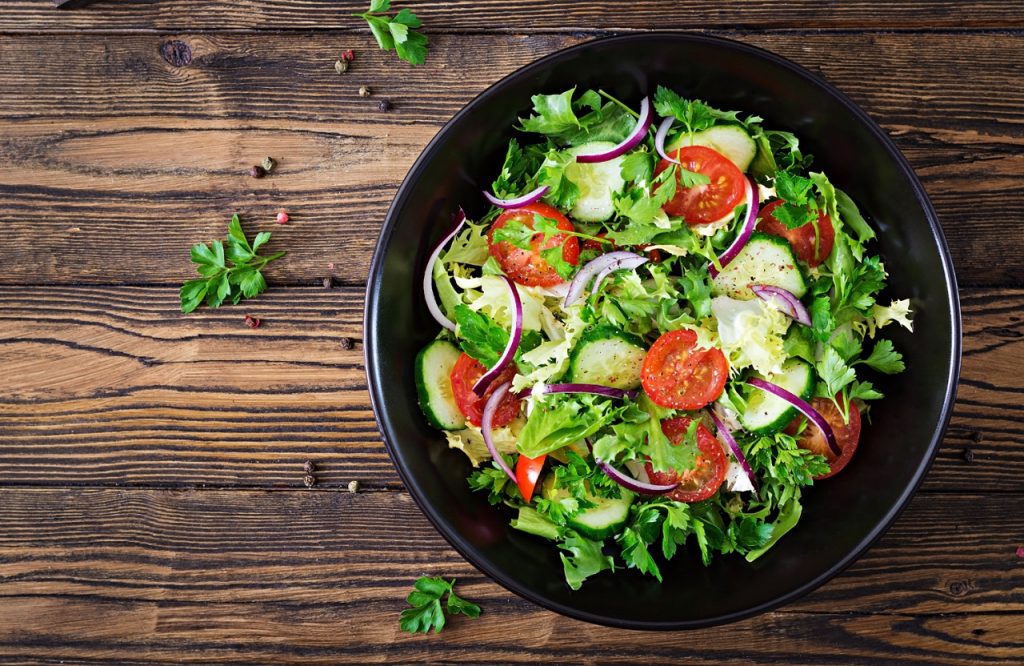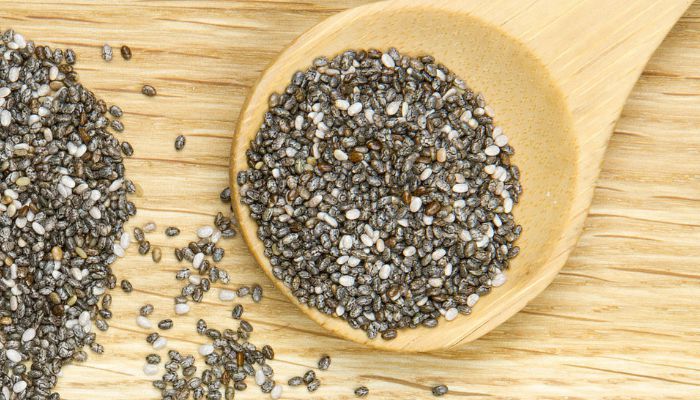
This Independence day let’s get healthy and try out some of these power packed nutrient salads. Why are salads important and what are its health benefits is nicely described in this blog https://goqii.com/blog/health-benefits-of-eating-a-bowl-of-salad-daily/.
Salad or veggies is the most important part of the meal platter. You cannot afford to skip if you want to get your daily dose of micronutrients. But, it is so boring and monotonous to cut slices of cucumber, tomato and onion and have it daily. There are various veggies available which you can twist and turn and make your salad interesting and colourful and tasty too. Wondering how? Keep reading.
Here I am listing some tasty salads with amazing dressings
- CRUNCHY MUNCHY SALAD

Crunchy Munchy Salad
Ingredients:
Wheat/Oat Flakes – ½ bowl
Baby Corn – 5-6 in no
Bell Peppers (3 coloured) – ½ bowl
Lettuce – 2 leaves
Pomegranate – ¼ bowl
Seasoning
Lime juice – 2-3 tap
Salt – according to taste
Chaat Masala – According to taste
Method
Roast the oats a bit. Then mix all ingredients with the seasoning. Toss well and serve.
- DETOX SALAD

Detox Salad
Ingredients:
Broccoli – ½ bowl florets
Carrot – ½ bowl juliennes
Bell Pepper – ¼ bowl juliennes (red, yellow, green)
Baby Corn – 4-5 in no diced finely
Cherry tomatoes – ¼ bowl or regular tomatoes
Red Cabbage- ½ bowl finely chopped
Zucchini (yellow) – ¼ bowl sliced
Alfa Alfa sprouts – 2 Tbsp (for garnishing)
Seasoning:
Vinegar – 2 tsp
Red Chilli Flakes – 1 tsp
Salt – according to taste
Flax seeds – coarsely pounded 2 tsp
Walnuts – coarsely pounded 3-4 in nos
Method:
Toss all ingredients with seasoning in a bowl.
Refrigerate for ½ an hour & serve.
- SPROUTED METHI SALAD

Sprouted Methi Salad
Ingredients:
Sprouted Methi Seeds – ½ cup
Pomegranate – ¼ cup
Cucumber – 1 in number diced
Carrot – 1 in number diced
Capsicum – ½ each diced (3 coloured)
Tomato – 1 in number chopped
Spring Onion – 1 stalk finely chopped
Seasoning:
Chaat Masala – ¼ tsp
Lemon Juice – ½ lemon
Salt – according to taste
Method:
Add all ingredients in a salad bowl. Add seasoning to the same. Toss well. And Serve.
- WALDORF SALAD

Waldorf Salad
Ingredients
10-12 cup Walnuts halves
2 tsp Flax Seeds
½ cup low-fat Yogurt
1 stick finely chopped Parsley
1 stick finely chopped Celery
1 teaspoon honey
2 leaves of Ice berg Lettuce chopped
2 large crisp Apples
Freshly ground black pepper
¼ cup Golden Raisins
½ Lemon, juiced
Method
Cut apple into chunks. Add all ingredients in a salad bowl. Toss all the ingredients. Refrigerate for 30-45 mins and serve.
- BEAN SALAD WITH PROBIOTIC DRESSING

Bean Salad with Pro-biotic dressing
Ingredients
Bean Sprouts – 1 cup
Fresh Pomegranate – ¼ cup kernels
Cucumber – 1 in number (diced)
3 coloured Bell Pepper – ½ each (diced)
Tomatoes – 1 in number (diced)
Dressing:
Curd – ½ cup
Honey – 1 tsp
Olive Oil – ½ tsp
Flax Seeds – 2 tsp (coarsely crushed)
Chaat Masala – ½ tsp
Salt – if required
Method:
For dressing: Whip all ingredients together with a fork. Add other ingredients in a bowl. Add the dressing and toss well. Refrigerate & serve on a bed of lettuce.
- TANGY TROPICANA

Tangy Tropicana
Ingredients:
Pineapple – 3 fresh slices (diced)
Cherry Tomatoes- 6-8 in numbers
Red, Yellow & Green Bell Peppers – ½ each cut into juliennes
Lettuce – 2 leaves chopped
Walnuts – 2 in no chopped
Seasoning:
Lime juice – ½ lemon
Honey – ½ tsp
Ginger – grated a small piece
Salt – As per taste
Black Pepper Powder – As per taste
Method:
Soak grated ginger, lemon juice & honey together
Add all veggies & walnuts in a salad bowl
Add the dressing prepared, salt & pepper
Toss well
Serve chilled
What are you waiting for? Get healthy-dress up your meal platter with the above colourful veggie mixes!
We hope these exotic salads inspire you to add a healthy and colorful twist to your meals this Independence Day! If you try any of these recipes, share your experience in the comments below. For more nutritious recipes and tips, check out Healthy Reads or speak to a certified expert by subscribing to GOQii’s Personalised Health Coaching here.
#BeTheForce
 Many individuals with ADHD also contend with anxiety, which can profoundly impact their everyday activities. Anxiety symptoms often include an elevated heart rate, rapid breathing, and increased muscle tension. However, there are straightforward and effective methods to mitigate these effects, such as breathing exercises, which can be particularly beneficial for those with ADHD.
Many individuals with ADHD also contend with anxiety, which can profoundly impact their everyday activities. Anxiety symptoms often include an elevated heart rate, rapid breathing, and increased muscle tension. However, there are straightforward and effective methods to mitigate these effects, such as breathing exercises, which can be particularly beneficial for those with ADHD.





